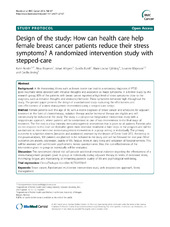| dc.contributor.author | Nordin, Karin | en_US |
| dc.contributor.author | Rissanen, Ritva | en_US |
| dc.contributor.author | Ahlgren, Johan | en_US |
| dc.contributor.author | Burell, Gunilla | en_US |
| dc.contributor.author | Fjällskog, Marie-Louise | en_US |
| dc.contributor.author | Börjesson, Susanne | en_US |
| dc.contributor.author | Arving, Cecilia | en_US |
| dc.date.accessioned | 2014-07-08T10:10:10Z | |
| dc.date.available | 2014-07-08T10:10:10Z | |
| dc.date.issued | 2012-05-04 | eng |
| dc.identifier.issn | 1471-2407 | |
| dc.identifier.uri | https://hdl.handle.net/1956/8060 | |
| dc.description.abstract | Background: A life threatening illness such as breast cancer can lead to a secondary diagnosis of PTSD (post traumatic stress disorder) with intrusive thoughts and avoidance as major symptoms. In a former study by the research group, 80% of the patients with breast cancer reported a high level of stress symptoms close to the diagnosis, such as intrusive thoughts and avoidance behavior. These symptoms remained high throughout the study. The present paper presents the design of a randomized study evaluating the effectiveness and cost-effectiveness of a stress management intervention using a stepped-care design. Method: Female patients over the age of 18, with a recent diagnosis of breast cancer and scheduled for adjuvant treatment in the form of chemotherapy, radiation therapy and/or hormonal therapy are eligible and will consecutively be included in the study. The study is a prospective longitudinal intervention study with a stepped-care approach, where patients will be randomised to one of two interventions in the final stage of treatment. The first step is a low intensity stress-management intervention that is given to all patients. Patients who do not respond to this level are thereafter given more intensive treatment at later steps in the program and will be randomized to more intensive stress-management intervention in a group setting or individually. The primary out-come is subjective distress (intrusion and avoidance) assessed by the Impact of Event Scale (IES). According to the power-analyses, 300 patients are planned to be included in the study and will be followed for one year. Other outcomes are anxiety, depression, quality of life, fatigue, stress in daily living and utilization of hospital services. This will be assessed with well-known psychometric tested questionnaires. Also, the cost-effectiveness of the intervention given in group or individually will be evaluated. Discussion: This randomized clinical trial will provide additional empirical evidence regarding the effectiveness of a stress-management program given in group or individually during adjuvant therapy in terms of decreased stress, minimizing fatigue, and maintaining or enhancing patients’ quality of life and psychological well-being. | en_US |
| dc.language.iso | eng | eng |
| dc.publisher | BioMed Central | eng |
| dc.rights | Attribution CC BY | eng |
| dc.rights.uri | http://creativecommons.org/licenses/by/2.0/ | eng |
| dc.subject | Breast cancer | eng |
| dc.subject | Randomized multicenter interventions study with stepped-care approach | eng |
| dc.subject | Stress management | eng |
| dc.title | Design of the study: How can health care help female breast cancer patients reduce their stress symptoms? A randomized intervention study with stepped-care | en_US |
| dc.type | Peer reviewed | |
| dc.type | Journal article | |
| dc.date.updated | 2013-08-23T09:20:18Z | |
| dc.description.version | publishedVersion | en_US |
| dc.rights.holder | Karin Nordin et al.; licensee BioMed Central Ltd. | |
| dc.rights.holder | Copyright 2012 Nordin et al.; licensee BioMed Central Ltd. | |
| dc.source.articlenumber | 167 | |
| dc.identifier.doi | https://doi.org/10.1186/1471-2407-12-167 | |
| dc.identifier.cristin | 951432 | |
| dc.source.journal | BMC Cancer | |
| dc.source.40 | 12 | |

